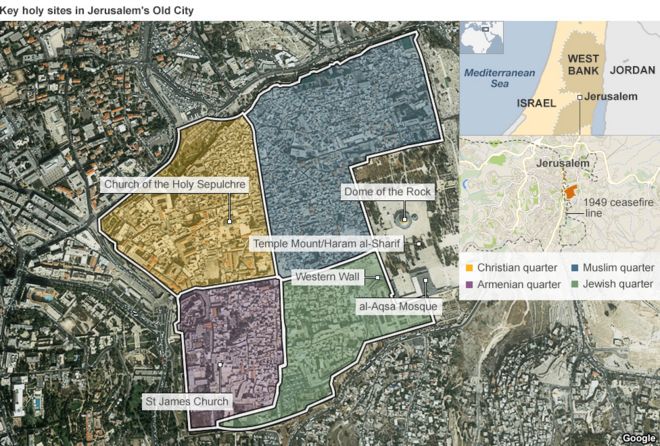There are increasing tensions between Israelis and Palestinians in Jerusalem, the fate of which is one of the most contentious issues in the Israel-Arab conflict.
The BBC's Erica Chernofsky takes a closer look at why this city is so important to Christianity, Islam and Judaism, the three religions which trace their shared origins back to the biblical figure of Abraham.

Jerusalem - its name resonates in the hearts of Christians, Jews and Muslims alike and echoes through centuries of shared and disputed history.
Known in Hebrew as Yerushalayim and in Arabic as al-Quds, it is one of the oldest cities in the world. It has been conquered, destroyed and rebuilt time and again, and every layer of its earth reveals a different piece of the past.
While it has often been the focus of stories of division and conflict among people of different religions, they are united in their reverence for this holy ground.
At its core is the Old City, a maze of narrow alleyways and historic architecture that characterises its four quarters - Christian, Muslim, Jewish and Armenian. It is surrounded by a fortress-like stone wall and home to some of the holiest sites in the world.
Each quarter represents its own population. The Christians have two, because Armenians are also Christians, and their quarter, the smallest of the four, is one of the oldest Armenian centres in the world.
It is unique in that their community has preserved its own particular culture and civilisation inside the St James Church and monastery, which comprises most of their section.

The church
Inside the Christian Quarter is the Church of the Holy Sepulchre, a significant focus for Christians all over the world. It is located on a site which is central to the story of Jesus, his death, crucifixion and resurrection.
According to most Christian traditions, Jesus was crucified there, on Golgotha, or the hill of Calvary, his tomb is located inside the sepulchre and this was also the site of his resurrection.
The church is managed jointly by representatives of different Christian denominations, mainly the Greek Orthodox Patriarchate, Franciscan friars from the Roman Catholic Church and the Armenian Patriarchate, but also by the Ethiopians, Coptics and Syrian Orthodox Church.
It is one of the main pilgrimage destinations for millions of Christians worldwide who visit the empty tomb of Jesus and seek solace and redemption in prayer at the site.

The mosque
The Muslim Quarter is the largest of the four and contains the shrine of the Dome of Rock and the al-Aqsa Mosque on a plateau known to Muslims as Haram al-Sharif, or the Noble Sanctuary.
The mosque is the third holiest site in Islam and is under the administration of an Islamic trust called the Waqf.
Muslims believe the Prophet Muhammad travelled here from Mecca during his night journey and prayed with the souls of all the prophets. A few steps away, the shrine of the Dome of the Rock holds the foundation stone, where Muslims believe Muhammad then ascended to heaven.
Muslims visit the holy site all year round, but every Friday during the holy month of Ramadan, hundreds of thousands of Muslims come to pray at the mosque.

The wall
The Jewish Quarter is home to the Kotel, or the Western Wall, a remnant of the retaining wall of the mount on which the Holy Temple once stood.
Inside the temple was the Holy of Holies, the most sacred site in Judaism.
Jews believe that this was the location of the foundation stone from which the world was created, and where Abraham prepared to sacrifice his son Isaac. Many Jews believe the Dome of the Rock is the site of the Holy of Holies.
Today, the Western Wall is the closest place Jews can pray to the Holy of Holies.
It is managed by the Rabbi of the Western Wall and every year hosts millions of visitors. Jewish people from all over the world visit this place to pray and connect to their heritage, especially during the High Holidays.
Video and production by Avi Halfon and Alon Farago

No comments:
Post a Comment